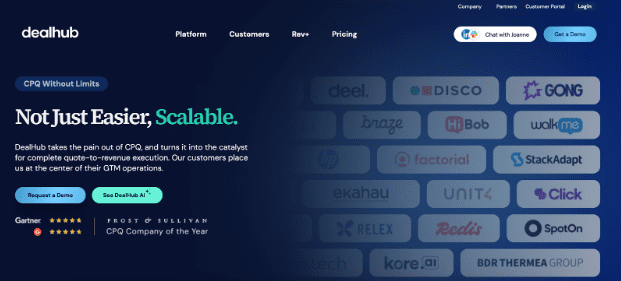Revenue Operations has emerged as one of the most critical battlegrounds in enterprise technology. As organizations grapple with complex buyer journeys, subscription-driven models, and pressure for predictable growth, the need for seamless coordination across sales, finance, and legal has never been greater. It’s in this context that Dreamforce 2025, Salesforce’s flagship event, will convene at San Francisco’s Moscone Center this October, bringing together the companies building the next generation of RevOps solutions.
In a recent roundup, the San Francisco Tribune highlighted ten platforms making the biggest impact on this evolving landscape. At the top of the feature was DealHub, a unified revenue platform that is gaining traction with enterprises seeking to consolidate CPQ, contracts, subscriptions, and billing into one streamlined system. Its inclusion reflects the growing demand for RevOps tools that prioritize execution speed, adoption, and operational resilience.
Why DealHub Stood Out
DealHub’s placement at the front of the Tribune article reflects its ability to address one of the most persistent enterprise pain points: fragmented revenue systems. Historically, companies have relied on a patchwork of CPQ tools, contract management platforms, and billing software, an approach that slows deal velocity, complicates compliance, and inflates costs.
By consolidating CPQ, Contract Lifecycle Management, Digital DealRoom, Subscriptions, and Billing into a single platform, DealHub eliminates those silos. The platform’s AI-powered CPQ is designed for rapid rollout and intuitive adoption, avoiding the consultant-heavy implementations that often accompany enterprise-grade systems. Notably, companies such as Intuit, Braze, Redis, Gong, and Deel have found success using DealHub, gaining real-time visibility into pricing and contracts while empowering sales teams to move faster. Their success stories inspire hope for accelerated and more predictable revenue growth.
A Broader Ecosystem of Innovators
The Tribune’s roundup also underscored the variety of challenges that RevOps providers are tackling. Ironclad, for example, is transforming contract lifecycle management by using AI to turn agreements into actionable growth engines. Certinia, built natively on Salesforce, is helping services organizations connect sales, delivery, and finance, offering a more holistic view of the customer journey.
DocuSign was highlighted for evolving beyond e-signatures into Intelligent Agreement Management, unlocking business data previously trapped in static documents. Chargebee, meanwhile, is a go-to solution for subscription businesses, providing end-to-end control over billing, collections, and revenue recognition.
The list also reflected the growing role of AI in sales productivity and forecasting. Outreach is applying AI agents to automate workflows across sales and customer success, while SiftHub focuses on centralizing deal knowledge from disparate tools to remove friction for sales engineers and account executives. RightRev, by contrast, zeroes in on finance leaders, offering native Salesforce revenue recognition that ensures compliance while supporting different go-to-market models. LeanData’s no-code orchestration platform was recognized for turning buying signals into revenue, while Seismic’s Enablement Cloud is equipping front-line teams with AI-driven content and skills to optimize buyer engagement.
Together, these companies illustrate how RevOps is no longer a niche function but a critical foundation for scalable growth. Each is addressing a different bottleneck, but all share the goal of creating faster, more transparent revenue cycles.
Building Momentum Into Dreamforce
The San Francisco Tribune’s feature placed DealHub first, underscoring the traction the platform has earned in a crowded market. For enterprises weary of disruptive software migrations and lengthy digital transformations, DealHub’s continuity-first strategy offers a stable yet forward-looking alternative.
As Dreamforce 2025 approaches, this visibility positions DealHub and the other companies highlighted as central players in the conversation about how to modernize revenue operations. With economic pressures forcing leaders to scrutinize both efficiency and growth, the demand for unified, AI-powered platforms is only set to rise.
When business leaders gather at Dreamforce this October, the debate won’t be about new features or integration, but rather which platforms can cut through complexity and deliver revenue outcomes without delay. DealHub’s placement in the roundup suggests it is already helping to set that agenda.































